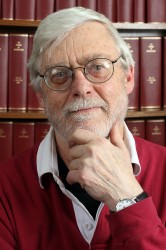The pioneering research of Jon Kaas has formed one of the foundations of modern neuroscience and has provided the basis for improved therapies for brain injury.

Kaas, who is the Distinguished Centennial Professor of Psychology at Vanderbilt University, has pioneered the mapping of the cerebral cortex of primates and a diverse variety of other mammalian species ranging from star-nosed moles to East African hedgehogs.
The importance of his contributions has been recognized by his selection as the 2014 recipient of the George A. Miller Prize in Cognitive Neuroscience. The award was established by the Cognitive Neuroscience Society to recognize individuals whose careers are characterized by sustained scholarship and research at the cutting-edge of their discipline and whose research has had, or has the potential for having, a revolutionary impact on the field of cognitive neuroscience. According to CNS, the hallmark of recipients’ work is “extraordinary innovation and high impact on international scientific thinking.”
By cataloguing specific similarities and differences of the cerebral cortex among primates and closely related mammals, Kaas and his colleagues have helped explain the variations in behavioral complexity across species. His discoveries underpin modular theories of perception and cognition that assign distinct functions, such as motor control of the hand, to specific areas of the cortex. His cortical maps also play a key role in interpreting the images of the human brain made by non-invasive technologies such as functional MRI.
In the course of his research, Kaas discovered that the adult brain is plastic and can reprogram itself to recover lost capabilities after it has been injured. This landmark finding overturned well-established beliefs, triggered extensive new research, helped explain the “phantom limb” experience of amputees and led to more effective approaches to rehabilitating patients after brain damage and to improvements in childhood education.
Kaas is a member of the National Academy of Sciences and a fellow of the American Academy of Arts and Sciences and American Association for the Advancement of Science, and has received numerous awards and honors. He has published more than 370 scientific papers, which have been cited nearly 20,000 times in other papers. Many of the students that Kaas has mentored have gone on to become leaders in neuroscience, including two who have received MacArthur “genius” awards.